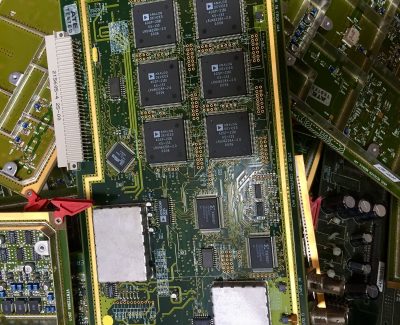WEEE Legislation – What’s Changed?
The WEEE (Waste Electrical and Electronic Equipment) Directive was put in place by the EU to regulate the disposal of WEEE goods. It provides guidelines as to the suggested amount of electrical products that can be recycled by each member state, but it leaves each state free to decide just how much more than the minimum amount they want to recycle. This is all geared towards the promotion of recycling electronic goods with the aim of improving the environment, and improving the environmental performance of those businesses that manufacture, supply, use, recover and recycle such equipment.
Of course, if WEEE is not correctly disposed of, it can be extremely hazardous to both the local community and the environment, so it’s important that as much electrical equipment as possible is recycled or reused.
In 2008, it was decided that the Directive should be revised, as it was felt that this would not only clarify the responsibilities of the member states, but that it would also reduce many administrative burdens and guarantee more cohesion between new and existing policies and legislation.
Such policies related in particular to the retrieval of raw materials and to the correct procedures for disposing of and recycling electrical and electronic equipment. While the recovery of raw materials was included in the original Directive, such procedures required greater emphasis, and the revisions go some way to addressing this.
Current figures show that approximately 65% of electrical and electronic equipment is collected separately, and of this 65%, less than half is treated in accordance with the Directive. It’s predicted, in fact, that most of the material that isn’t treated appropriately goes to landfill or substandard treatment facilities, which can result in the loss of valuable secondary raw materials and an increase in the risk of hazardous substances, including those with Ozone depleting and global warming potential, which are leaked into the environment.
In order to address this, the revised EU Directive has a set of compulsory collection targets, which all member states must adhere to. Such targets vary from state to state, depending on whether or not an individual member state is a high consumer of electrical goods or not. Previously it was a case of ‘one size fits all’, with all private households predicted to contribute 4kg of electrical waste per inhabitant per year. The revisions aim to lessen the confusion surrounding this, and to make all relevant legislation fairer and more universal for the individual member states.
So how does this affect grass-roots companies, those working on the front-line of WEEE collection? Well, at Remet Processing, they’re fully licensed to process all categories of WEEE under the WEEE Directive. In fact, they’ve set out to minimise the amount of electronic equipment that goes to landfill thanks to their investment in state-of-the-art processing technology at their authorised, approved treatment facility in Mexborough. This technology allows them to effectively recycle a range of appliances, including household and office appliances, as well as computer equipment, thereby significantly reducing the amount of electrical equipment (and precious and non-precious metal) that goes to landfill. This has helped them to reduce their impact on the environment, and means that they’re able to adhere to all relevant legislation.
